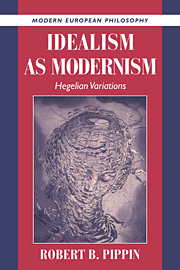Book contents
- Frontmatter
- Contents
- Acknowledgments
- Abbreviations
- Dedication
- 1 Introduction: Hegelianism?
- Part One The Original Options: Kant Versus Hegel
- 2 Kant on the Spontaneity of Mind
- 3 On the Moral Foundations of Kant's Rechtslehre
- 4 Hegel, Ethical Reasons, Kantian Rejoinders
- 5 Avoiding German Idealism: Kant, Hegel, and the Reflective Judgment Problem
- Part Two Critical Modernism
- Part Three Greeks, Germans, and Moderns
- Part Four Narrating Modernity
- Part Five Modernism and Nihilism
- Part Six Heidegger's “Cuhnination”
- Part Seven Hegelianism
- Name Index
- Subject Index
4 - Hegel, Ethical Reasons, Kantian Rejoinders
Published online by Cambridge University Press: 05 June 2012
- Frontmatter
- Contents
- Acknowledgments
- Abbreviations
- Dedication
- 1 Introduction: Hegelianism?
- Part One The Original Options: Kant Versus Hegel
- 2 Kant on the Spontaneity of Mind
- 3 On the Moral Foundations of Kant's Rechtslehre
- 4 Hegel, Ethical Reasons, Kantian Rejoinders
- 5 Avoiding German Idealism: Kant, Hegel, and the Reflective Judgment Problem
- Part Two Critical Modernism
- Part Three Greeks, Germans, and Moderns
- Part Four Narrating Modernity
- Part Five Modernism and Nihilism
- Part Six Heidegger's “Cuhnination”
- Part Seven Hegelianism
- Name Index
- Subject Index
Summary
Rousseau's Problem
The term ethical reason is not a Hegelian term of art, but it highlights a problem Hegel clearly must address. He is well known for claiming that a worthy or good life involves achieving some sort of identification with various modern social institutions. It is only by participating in such institutions, by adopting and affirming the central modern social roles, that a good life with others can be led. However, Hegel does not believe that this process of identification is wholly psychological or a social fact of the matter. The basis of the reconciliation is, in some way, reason.
Traditionally, this has often been understood to mean that the central modern institution for Hegel, the state, represents some sort of necessary manifestation or coming to self-consciousness of World or Cosmic Spirit. Various modern institutions are rational because of the role of such institutions in the unfolding of reason itself, logos, or the word of God. My purpose in the following is to show that Hegel ought not to be understood as advancing any such theodicy or cosmic claim, that he means pretty much what he seems to mean when he says such things as in “the ethical world” it is “reason” that has “power and mastery,” or that “the science of right” will “conceive and present the state as something in itself rational,” or, in Gans's addition, “In right, man must meet with his own reason.”
- Type
- Chapter
- Information
- Idealism as ModernismHegelian Variations, pp. 92 - 128Publisher: Cambridge University PressPrint publication year: 1997
- 2
- Cited by



